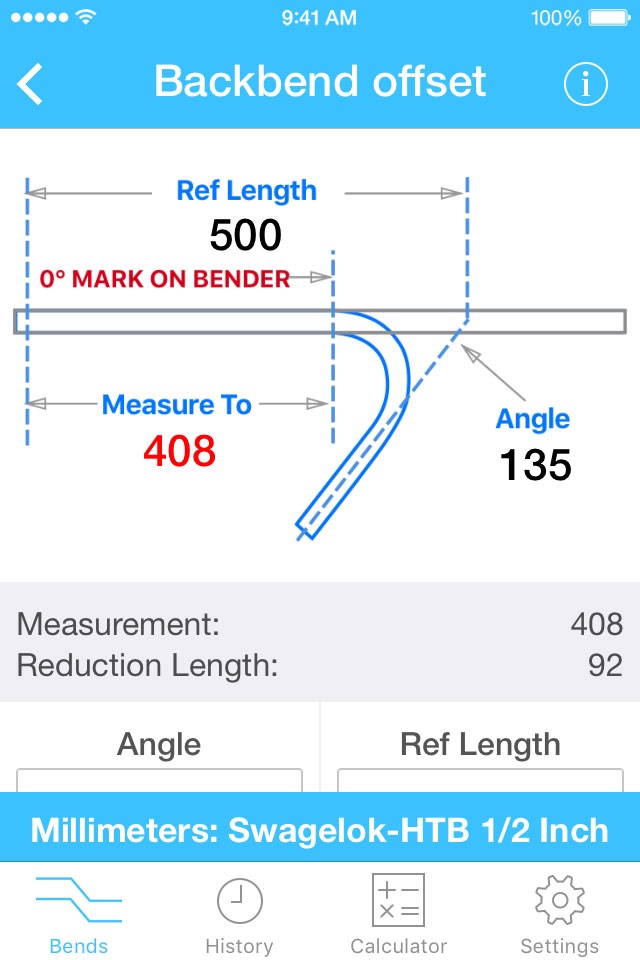
Hand Tuber Offset Calculator
‘Hand Tuber’ is a simple to use tubing offset calculator, and offers the field tubing specialist a handy tool to accurately place stainless instrument or copper tubing bend offsets in the field, utilising its in-built bender library and specialized calculations for both Metric and Imperial measurements.
This tool has been specifically developed to calculate for all bend angles, and not just 30°, 45°, 60°, and 90°, for those times where tubes are required to be run between obstacles such as beams, cable ladders, and pipework.
‘Hand Tuber’ also allows you the benefit of being able to add your own specific Rotary Draw Tube Bender to the bender choices in the library.
Imperial and metric benders are included in the inbuilt bender library, and the calculator can be used with both inches and millimeters as a unit of measure with a high degree of accuracy.
In a Nutshell:
• Seven common Tubing Offset calculations included in the program.
• Can be used for most Rotary Draw type benders (Center Line Radius)
• All results are calculated by using the tube center and/or bender radius.
• All calculations are based on trigonometry formula giving precision.
• Hand Tuber can be set up for either inches or millimeters.
• The most common Imperial and Metric bender profiles are included.
• Add new benders in ‘Add Benders’, and build a new bender profile.
• Maintains a History of your previous completed bend calculations.
• Help screens included for all bend offsets and are quickly accessible.
• Most calculations are completed on a single screen.
• Handy graphics show the calculation results as a visual reference.
• Adjustment, Offset, and Seating Allowance reference charts included.
• Handy standard calculator function within the app.
• Ease of navigation to switch pages quickly and directly.
• Access to Online Tubing Manual via a handy link from the app.
So what’s the bottom line:
Fast on screen calculations, no need to use ‘cast offs’ to find that bend position.
Helps to save wastage and reduce that ‘Bone Pile’ or stock of ‘Future Bends’.
Saves time in working out those common and tricky offsets quickly.
Finds the answer when the ‘Measure then Bend’ technique won’t work.
Very handy, fits in your pocket or bag on your mobile device.
Offsets and Calculations Included in the Current Release:
Simple Offset:
The simple offset calculates the position of the second bend in a standard 2 bend offset, based on the previous Pre-Bent angle and the offset required for any angle between 0° and 90°.
Predictive Offset:
The predictive offset calculates the second bend in a standard 2 bend offset, based on the previous planned bend angle, and the required offset, before either bend in the offset has been bent for any angle between 0° and 90°.
Parallel Offset:
The parallel offset calculates the position adjustment of the bend in a parallel tube, by giving the +/- length needed in order to maintain a consistent spacing between tubes with a change in direction.
Long Run Offset:
The Long Run Offset calculates the Slope Length and Bend Angle for long runs of tube with a fixed or known Offset and Run length.
Back Bend Offset:
The Back Bend Offset calculates the bender 0° position, for a bend that folds back on itself at an angle greater than 90°. This is useful when running tube on beams and cross braces.
Joint Offset:
The Joint offset calculates the measurements and offsets to aid in the positioning of an offset tube joint or connecter in a specific location, and gives the measurements to place the center of the joint.
Fall Calculation:
The Fall Calculator calculates the fall or Offset amount, over a set distance based on a fall ratio.
The usual fall minimum for tubing in instrumentation is 1:12 or 8.33%.



